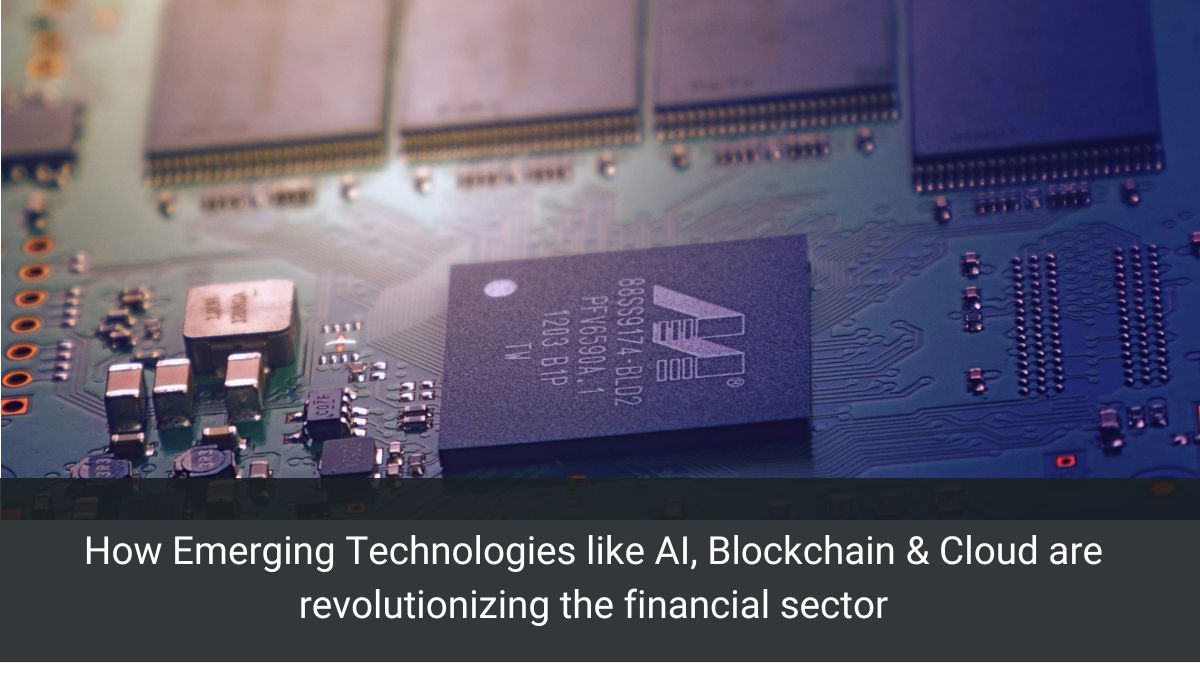AI
How Emerging Technologies like AI, Blockchain & Cloud are revolutionizing the financial sector

From the inception of online banking to mobile payments, the financial sector has witnessed significant foundational changes as it embraces digital transformation and streamlines business operations. Since then, the pace of technological transformation has only accelerated, with emerging technologies such as AI, blockchain, cloud computing, and the Internet of Things (IoT) being implemented. Adopting these next-gen technologies is redefining customer engagement and unlocking new avenues for growth, which can be leveraged to unlock future potential.

Mr. Ramasubramanian V
Financial services firms are expected to spend $300 billion on technology by 2025, with significant portions allocated to AI, Blockchain, and Cloud Computing (Source: McKinsey).
AI, Machine Learning, and Data Analytics: The Holy Trinity
The future includes AI and data analytics as critical components of the financial decision-making process. These technologies will enable businesses to conduct real-time analyses of datasets, uncovering trends and actionable insights. These findings will be crucial for various tasks, including fraud detection, risk management, and customer service.
AI and ML systems can analyze vast amounts of transaction data to identify patterns of fraudulent activity. They can detect anomalies and flag suspicious transactions in real time, thereby reducing the incidence of financial fraud.
AI models assess the risk profiles of individuals and businesses by analyzing a wide range of data points, including financial history, transaction behavior, and market conditions. This leads to more accurate credit scoring and risk assessment, resulting in better decision-making.
AI-powered chatbots and virtual assistants provide customers with instant support and assistance. They can handle a wide range of inquiries, from account information and transaction details to more complex issues, thereby improving customer satisfaction and reducing the workload on human customer service agents.
The Rise of Blockchain
The foundation of blockchain lies in its decentralized system, which is increasingly playing a vital role in the financial services sector by establishing a transparent and secure network. Blockchain is becoming relevant for facilitating secure and efficient transactions, lending, asset transfers, and much more.
Smart contracts have given rise to decentralized finance (DeFi) applications, offering financial services such as lending, borrowing, and trading on decentralized platforms without traditional intermediaries.
Blockchain provides a secure and transparent way to record and verify transactions, as it is encrypted, ensuring data integrity and enhancing trust. This is particularly valuable for auditing and regulatory compliance.
Cloud Capabilities: Redefining Possibilities
Financial institutions increasingly rely on cloud services to securely store and manage vast amounts of data. With their scalability, cloud storage solutions can handle the growing volume of economic data, enabling efficient data retrieval and analysis.
Cloud computing solutions offer robust disaster recovery options, ensuring that financial institutions can recover their data and systems during emergencies. This enhances business continuity, minimizes downtime, and maintains service availability.
Cloud-based tools facilitate employee collaboration by providing shared access to documents, applications, and other platforms. This enables financial professionals to work remotely and access sensitive data securely, without the risk of data leakage.
The Synergy Between AI, Blockchain, and Cloud Computing
Combining AI and blockchain can significantly enhance security and operational efficiency in the financial sector. AI algorithms can analyze blockchain data to detect patterns, anomalies, and potential fraud in real-time, thereby improving security measures multifold.
Conversely, blockchain provides a secure and transparent data ledger for AI models, ensuring the integrity and authenticity of the data for decision-making. By integrating these technologies, financial institutions can automate and streamline processes such as identity verification, transaction monitoring, and compliance reporting, reducing errors.
Cloud computing plays a crucial role in facilitating the necessary computational power and scalable infrastructure to run complex AI algorithms and maintain extensive blockchain networks without the need for investing in physical hardware. This accessibility accelerates innovation and deployment, allowing financial firms to stay competitive and responsive to market needs.
Potential Impact on the Financial Sector
Operational Efficiency
Integrating AI, blockchain, and cloud computing will streamline financial operations, reduce costs, and enhance the accuracy and speed of transactions and decision-making processes.
Customer Experience
Personalized and efficient services powered by AI, secure transactions ensured by blockchain, and the flexibility of cloud computing will collectively enhance the overall customer experience in financial services.
Regulatory Compliance
These technologies will enable better compliance with regulatory requirements through automated reporting, enhanced data security, and transparent audit trails.
Sustainable Finance
Sustainable finance considers several criteria, such as environmental, social, and governance (ESG) factors, and employs tools like green bonds and impact investing to generate measurable impact along with financial returns.
Expected Advancements in AI, Blockchain, and Cloud Computing
Artificial Intelligence
Improvement in Machine Learning (ML) algorithms and Natural Language Processing (NLP) will enhance AI’s capabilities in predictive analytics, customer service, and personalized financial advice.
Blockchain
Advancements in blockchain technology will address scalability and interoperability issues, making it more feasible for large-scale financial applications. Innovations like sharding and cross-chain solutions will enhance blockchain performance.
Cloud Computing
The development of more advanced cloud services, including edge computing and hybrid cloud solutions, will provide financial institutions with greater flexibility, security, and efficiency in managing their IT infrastructure.
The BFSI sector is undergoing a continuous digital transformation powered by the integration of new technologies. AI, Blockchain, and Cloud Computing are pivotal in enhancing customer experience, enabling data-driven decision-making, strengthening cybersecurity measures, and streamlining regulatory compliance. By leveraging these technologies, financial institutions can unlock their full potential to transform business operations and achieve sustainable growth. The future of finance is undoubtedly digital, and organizations that adopt and embrace these innovations are poised to lead the way forward.
(Authored by Mr. Ramasubramanian V, Deputy Vice President, Technology, Novac Technology Solutions)
